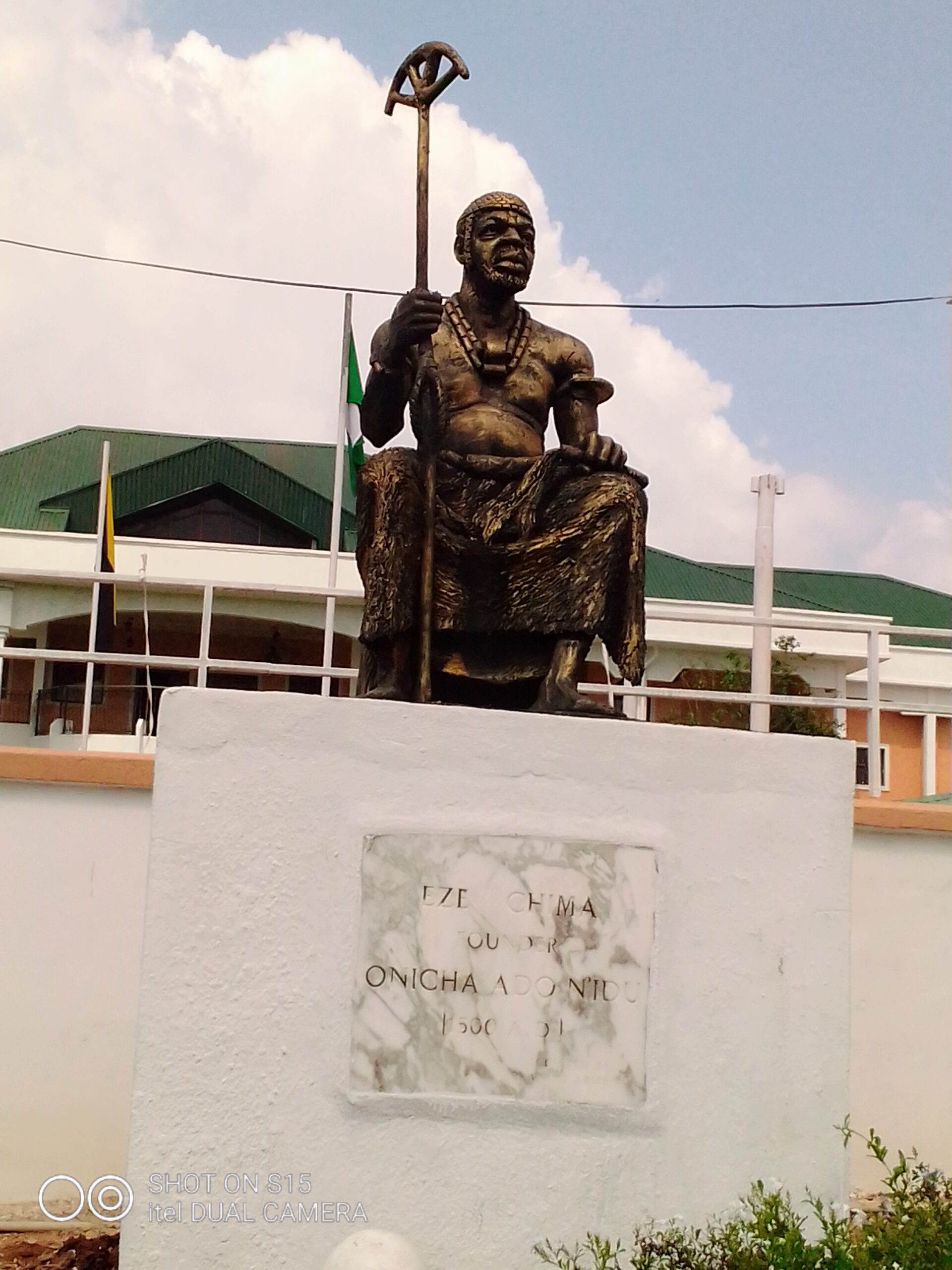By Victor Anazonwu
For many years, the story of Eze Chima has stood at the crossroads of Igbo and Benin history — told and retold in different voices, sometimes clouded by myth, pride, or politics. Many communities across today’s Anioma region and parts of Anambra trace their origins to this mysterious figure who is often said to have “come from Benin.” But what does that really mean? Was Eze Chima a Bini man by birth, or an Igbo man whose destiny became intertwined with the great Benin Kingdom? This is the real story — one that blends history, migration, and insight in fascinating ways.
The Power and Prestige of Ancient Bini
In the three to four centuries before British colonial rule reached Nigeria, the Kingdom of Bini (Anglicized as Benin) stood as one of the most powerful and prosperous states in what is now southern Nigeria. To the peoples of the region, Bini was what the United States of America is to the modern world — the place to be.
Unlike many of its neighbors, Bini had evolved a strong, centralized political system with the Oba as its unchallenged fulcrum. Leveraging the immense loyalty of his people, the Oba built a formidable army that conquered, subdued, or earned the allegiance of several neighboring communities and groups. Beyond the reach of his warriors, his influence spread through admiration, trade, and soft power — carried by travelers and storytellers alike.
To “go to Bini” was like going to America. To “return from Bini” was a badge of honor — a mark of prestige and proof of exposure to civilization and power.
Enter Eze Chima
It was in this setting that a certain Eze Chima (sometimes written Chime) lived — a man who would later found or inspire the founding of many communities between Bini and the River Niger, stretching as far as Onitsha in present-day Anambra State. His descendants today make up large parts of the Anioma or Western Igbo in Delta State.
Chima was not ethnically Bini, though he lived for many years in Benin City and may even have been born there to Igbo parents who had migrated from the east. Some traditions identify him as Aro from Arochukwu, others as Nri from Aguleri. Both the Aro and Nri were well-travelled Igbo communities and subcultures. What most accounts agree on is that he was a gifted medicine man and spiritual adviser who achieved great success and prominence in Benin.
The Benin Version
The Benin oral tradition speaks of a certain Inkwin, a native doctor who healed the Oba of a serious illness. After his service, Inkwin and his people reportedly left Bini and settled among the Igbo.
When both traditions are compared, it seems clear that Inkwin and Chima refer to the same historical figure — an Igbo man who gained fame and fortune in Benin, served in the royal court, and eventually fell out with his hosts. Inkwin was probably his nickname and a mark of endearment among his Bini hosts. Some versions say the Oba made him a high-ranking chief and royal adviser. Others suggest that he married Bini women, establishing deep ties with the kingdom before a quarrel forced his departure.
After that conflict, Chima gathered his family and followers and set out eastward, determined to move beyond the Oba’s military reach. Along the way, his children and companions founded or settled in a series of communities that survive to this day. All bear Igbo names:
Obior – believed to be his final home and resting place.
Issele-Uku
Issele-Mkpitime
Issele-Azagba
Obomkpa
Onicha-Ukwu
Onicha-Olona
Onicha-Ugbo
Onicha Ado n’Idu (modern-day Onitsha, Anambra State)
Ezi, said to have been founded by his youngest daughter.
Why did Chima turn East?
When abroad and forced to flee by inclement circumstances, migrants instinctively move towards “home”; towards safer and more familiar environs. Eze Chima could have gone West, North or South. But he chose to move Eastward. It was a natural and instinctive move. East was where he came from, a route he was more familiar with. It was where he felt safest and most at home. It was towards his kith and kin. Just as when Israel left Egypt in the Exodus story. They moved in the direction they came from, towards “the promised land.” Towards home.
Intermixing and Integration
Chima and his followers did not find uninhabited lands. They met existing communities and settled among them. This explains why there are other Western Igbo groups in the area who do not trace their ancestry to Chima but acknowledge his coming and influence. Over time, intermarriage, trade, and cultural exchange fostered both genetic and cultural fusion with the travelling party from Bini.
What “Coming from Bini” Really Means
The popular saying that many Anioma or Western Igbo communities “came from Bini” does not mean they were ethnically Bini. It reflects a historical reality in which Benin was a regional superpower — a center of prestige, influence, and opportunity. To have “come from Bini” was a mark of social distinction, not a statement of ethnic origin; a stamp of cultural diffusion, not a statement of self denial.
Eze Chima’s exposure to Bini culture and politics, his years of residence there, and possibly his marriages to Bini women all explain the Bini flavor in some Anioma communities and customs today. Yet his roots and language remained unmistakably Igbo.
The Proof is in the Names
Perhaps the strongest evidence of Chima’s true origins lies in his name — and those of his descendants. In anthropology, names are among the most enduring markers of ethnic identity. Neither “Eze” nor “Chima” has any equivalent or recognizable root in the Bini language. Both are distinctively Igbo:
- Eze means king.
- Chima (or Chuma, in some dialects) means God knows.
It is inconceivable that a native-born Bini man would bear such names, speak Igbo, and raise children in that linguistic tradition. No one abandons the proud heritage of a powerful kingdom like Bini to assume the full identity of a neighbor.
Bini was, and remains, a proud and ancient civilization — but it was not the sole origin or source of everything noble among its neighbors, including the Igbo.
Lessons from Modern Parallels
A modern analogy may help make the point clearer. Consider Bukayo Saka and Eberechi Eze, two young men of Yoruba and Igbo ancestry respectively, born and raised in England and now representing England’s national football team. In centuries to come, if their descendants were to migrate to Nigeria, people might say they “came from England.” But that would not make them ethnically English.
Their names — Saka and Eze (that name again) — would still point unmistakably to their African roots. In the same way, the name Eze Chima remains a clear marker of his Igbo heritage, even though his life and legend became deeply intertwined with the history of Bini.
A Bridge Between Two Worlds
Eze Chima’s story is more than a tale of migration. It is the story of a man who bridged two powerful civilizations — Bini and Igbo — and left a legacy that reshaped the cultural and demographic landscape of southern Nigeria. His journey eastward sparked the birth of new towns, new traditions, and a new blend of identities that continue to define parts of Anioma and Onitsha today.
Although the true story of Eze Chima and the other peoples of Anioma has been politically engineered in recent years, notably since the Nigerian Civil War of 1967 – 1970, the historical framework remains intact and unmistakable.
To understand Eze Chima is to understand how history, movement, and memory combine to form identity — and why, even centuries later, some Igbo communities still proudly say they “came from Benin.”
Victor Anazonwu is a historian, public affairs analyst and author of several books, including What Everyone Should Know About Nigerian History Politics and Government (Amazon, 2017)



























